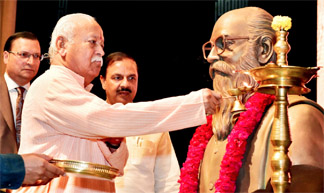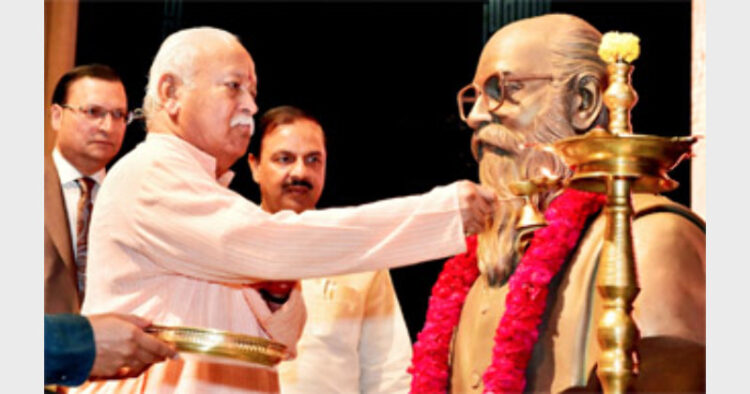 Ajay Bhardwaj
Ajay Bhardwaj
India needs to evolve its indigenous and all-inclusive development model which is based on the tenets of dharma. Delivering the 7th annual Nanaji Deshmukh memorial lecture organised by Deendayal Research Institute in Delhi last week, RSS Sarsanghchalak Shri Mohan Rao Bhagwat said after the world over economists tried different economic models, eventually this view is being widely accepted internationally that every country should have its
independent growth model which is rooted in its culture and way of life. He recalled different economic growth models adopted by various countries since 1950s. But a U-turn came about in 2008 when internationally it was accepted that indigenous culture should shape the growth model.
India’s growth model, he said, essentially has to evolve from the values and ethos that we cherish, that has been the sustaining force for us for centuries. He said after India had peaked in material progress in the ancient times, sages set some values for the society that formed foundation for the dharma. The foremost among them was that all of us must live together harmoniously with the nature.
Our dharma is not religion as is popularly made out to be. It is a guiding principle for all the activities that one undertakes during the lifetime. One of the
hallmarks of it has been that our lifestyle should be in consonance with the nature and ecology around us.
So the Indian development model based on dharma would not have development and environment working in conflict with each other. All over the world wherever development works are being undertaken environmentalists have been up in arms. The conflict is inevitable because
development models followed by the western countries are “maximum gain for maximum people”.
It is not “all gains for all people” as the Indian model driven by dharma would propound. He lauded the Modi government for adopting the paradigm, “Sabka saath, sabka vikas” and said this thesis was grounded in the values of dharma of the Indian soil and that is why it has such a wide and powerful echo all across the country.
The dharma-based model unifies all members of the society, takes everybody along the path of welfare and progress. He said unlike other nations which are united by their language or economic policy, India is bonded by its dharma in spite of its disparities.
This, he said, was reflected in the philosophy of both, Mahatma Gandhi as well as that of Deendayal Upadhaya. Both said the litmus test for a growth model would be when the last man in the queue, the most-downtrodden
member of the society, also reaps the fruits of growth and development. It’s an all-inclusive exercise, which does not leave anybody deprived. Moreover, it is all-participative as well, in which every member contributes pro-actively, while the government and the
administration lend a supporting hand
He said this model was implemented in letter and spirit at the Chitrakoot ashram, set up by Nanaji Deshmukh, and has been a living example of this thesis. India needed to emulate that instance to become a “vishvaguru”.















Comments